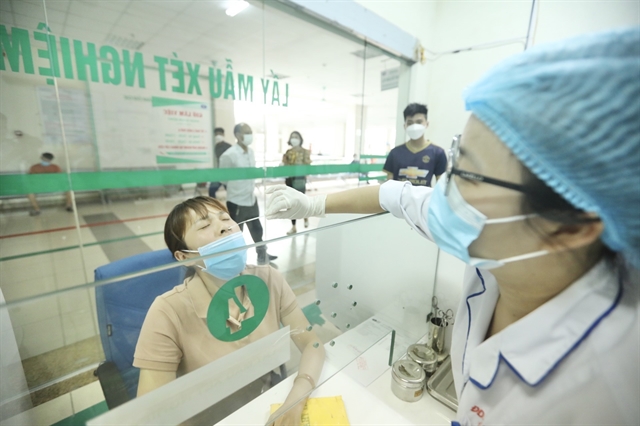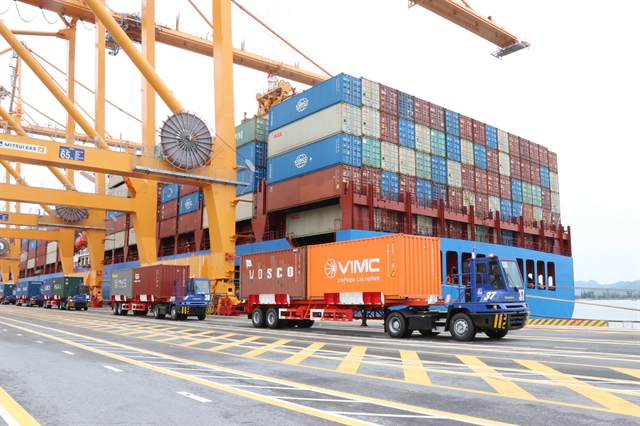 Society
Society

.jpeg) |
| Patients who contract influenza A are treated at Hà Nội’s Thanh Nhàn Hospital. — VNA/VNS Photo |
HÀ NỘI — The Ministry of Health has urged health departments nationwide to strengthen inspection and crackdown on businesses that illegally speculate and sell influenza drugs, rapid testing kits and other medical devices.
Under Decree 4216, issued on August 5, the ministry requires health departments to strengthen the management of purchasing and selling testing biological products and drugs for influenza.
Market watchdog forces will be in charge of tightening the inspection of the declaration of prices to ensure the selling of drugs at declared prices and deterring acts of taking advantage of the shortage of drugs and medical devices in the market to speculate, hoard goods and sell them at abnormal prices.
A remarkable increase followed higher numbers of people contracting flu around the country, including in Hà Nội.
Since July, the number of people hospitalised for influenza has increased in some provinces and cities, with up to 97 per cent being influenza A infection cases.
Most cases were recorded in northern provinces, where seasonal changes have impacted people’s health, triggering disease outbreaks like seasonal flu.
Data from the Hà Nội Centre for Disease Control shows that the number of flu-infected people reached 887 in June, a 60 per cent increase in May.
Due to the increasing number of flu cases, people’s demand for flu drugs and rapid testing kits has also increased, leading to inflated prices on this type of goods, especially on social networks.
Tamiflu is sold online at the prices of between VNĐ700,000 (US$26.9) and VNĐ1 million ($38.4) for each box of ten tablets instead of VNĐ400,000 as previously, while a rapid testing kit costs between VNĐ150,000-180,000, three times higher than the normal price.
 |
| A medical staff takes samples for influenza A testing for a patient at the National Hospital for Tropical Diseases in Hà Nội. VNA/VNS Photo Minh Quyết |
To ensure the adequate supply of drugs and medical equipment for the prevention and control of seasonal influenza, the ministry has requested the people’s committees of the provinces and cities to direct pharmaceutical manufacturers to promptly increase production activities to supply drugs and biological products for seasonal influenza, especially rapid testing kits.
All units have been asked to ensure stable prices of treatment drugs and medical devices for seasonal flu, especially rapid testing kits. All products must be declared prices as stipulated.
To avoid price hikes and market scarcity, they must stop selling drugs and medical devices for flu treatment to other units.
Unvaccinated patients prone to serious complications
Health experts have warned that although many cases are reportedly mild and can be treated at home, those who are unvaccinated or suffer from underlined diseases are prone to serious complications. These groups of people needed to contact medical facilities for medical guidelines or examinations when having symptoms of influenza.
Phạm Văn Phúc, Deputy Head of the National Hospital for Tropical Diseases Intensive Care Unit, said immunocompromised patients infected with influenza A would likely be more severe than normal patients.
Elderly people over 65 years old, patients with underlying cardiovascular and respiratory diseases, diabetes, blood diseases, children under two years old and pregnant women are at high risk of getting severe cases.
Trần Thị Hoài, Head of Đức Giang General Hospital’s Infectious Diseases Department, said on average, the hospital receives more than 30 cases of influenza A per day.
The patients admitted to the hospital mainly suffered high fever, fatigue, and even pneumonia. There were two cases of respiratory failure.
Hoài said patients who suffered signs of severe change, continuous body pain, coughing, chest tightness, and difficulty breathing must go to medical facilities to have a timely treatment regimen and avoid serious complications.
“This year’s influenza A outbreak differs from that of every year. The peak time of the outbreak was September and October, but it has broken out since July this year,” she said.
The doctor explained that many people haven’t got vaccinated due to early abnormal outbreaks as they usually got a flu shot before the winter. This may also be the reason for the more complicated outbreak this year.
“Influenza vaccines are given periodically every year but can only prevent some strains of flu. Therefore, people’s immunity decrease when they are vaccinated, which can lead to severe cases,” she said.
Doctors have suggested that high-risk people should get flu vaccinated yearly to prevent the disease. When contracting the virus, patients need to go to medical facilities for specialist advice to avoid serious complications.
Currently, most flu-contracted cases are influenza A (H3N2, H1N1) and influenza B strains. Vaccines for these types of strains are available.
No deaths due to the highly virulent influenza A strains such as H5N1, H7N9, H5N6, and H5N8 have been reported. — VNS




